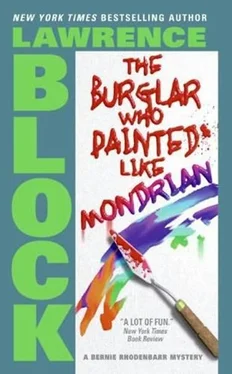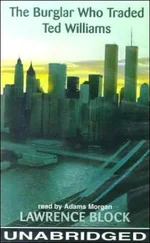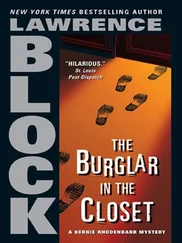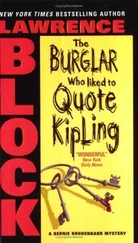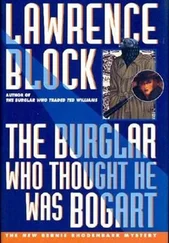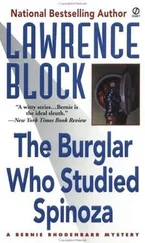I was sanding the third coat of gesso when she returned with a large book entitled Mondrian and the Art of De Stijl. She flipped it open to a page near the end, and there was the painting we’d seen in the Hewlett. “That’s it,” I said.
“How are the colors?”
“What do you mean? Aren’t they in the right place? I thought you took my sketch along.”
“Yes, and it’s a wonderful sketch. Burglary’s gain was the art world’s loss. Books of reproductions are never perfect, Bernie. The inks never duplicate the paint a hundred percent. How do these colors compare to what you saw in the painting?”
“Oh,” I said.
“Well?”
“I don’t have that kind of an eye, Denise. Or that kind of a memory. I think this looks about right.” I held the book at arm’s length, tilted it to catch the light. “The background’s darker than I remember it. It was whiter in-I want to say real life, but that’s not what I mean. You know what I mean.”
She nodded. “Mondrian used off-whites. He tinted his white with a little blue, a little red, a little yellow. I can probably make up something that looks sort of all right. I hope this isn’t going to have to fool an expert.”
“So do I.”
“Let me see how you did with the gesso. That’s not bad. I think what we want now is a coat or two of white, just to get that smooth canvas effect, and then a coat of tinted white, and then-I wish I could have like two weeks to work on this.”
“So do I.”
“I’m going to use acrylics, obviously. Liquid acrylics. He used oils but he didn’t have some lunatic at his elbow who wanted the finished painting in a matter of hours. Acrylics dry fast but they’re not oils and-”
“Denise?”
“What?”
“There’s no point making ourselves crazy. We’ll just give it our best shot. Okay?”
“Okay.”
“I’ve got a few things to do, but I can come back after I do them.”
“I can handle this myself, Bernie. I don’t need help.”
“Well, I was thinking while I was putting the gesso on the canvas. There are a few things I can be doing at the same time.”
“Only one person can work on a canvas at a time.”
“I know that. See how this sounds to you.”
I told her what I had in mind. She listened and nodded, and when I finished she didn’t say anything but stopped to light a cigarette. She smoked it almost to the filter before she spoke.
“Sounds elaborate,” she said.
“I guess it is.”
“Complicated. I think I see what you’re getting at, but I’ve got the feeling I’m better off not knowing too much. Is that possible?”
“It’s possible.”
“I think I want music,” she said, and lit another cigarette and switched on her radio, which was tuned to one of the FM jazz stations. I recognized the record they were playing, a solo piano recording of Randy Weston’s.
“Brings back memories,” I said.
“Doesn’t it? Jared’s over at a friend’s house. He’ll be home within the hour. He can help.”
“Great.”
“I love the Hewlett Collection. Of course Jared has a fierce resentment against the place.”
“Why?”
“Because he’s a kid. Kids aren’t allowed, remember?”
“Oh, right. Not even accompanied by an adult?”
“Not even accompanied by the front four of the Pittsburgh Steelers. Nobody under sixteen, no exceptions, nohow.”
“That does seem a little high-handed,” I said. “How’s a kid supposed to develop an appreciation for art in this town?”
“Oh, it’s real tough, Bernie. Outside of the Met and the Modern and the Guggenheim and the Whitney and the Museum of Natural History and a couple of hundred private galleries, a young person in New York is completely bereft of cultural resources. It’s really hell.”
“If I didn’t know better, I’d swear you were being sarcastic.”
“Me? Not in a million years.” She sucked on her cigarette. “I’ll tell you, it’s a pleasure to go in there and not have eight million kids bouncing off the walls. Or class groups, with some brain-damaged teacher explaining at eighty decibels what Matisse had in mind while thirty kids fidget around, bored out of their basketball sneakers. The Hewlett’s a museum for grownups and I love it.”
“But Jared doesn’t.”
“He will the day he turns sixteen. Meanwhile it has the lure of forbidden fruit. I think he must be convinced it’s the world’s storehouse of erotic art and that’s why he’s not allowed in it. What I like about the place, aside from the childless aspect and the quality of the collection, is the way the paintings are hung. Hanged? Hung?”
“Whatever.”
“Hung,” she said decisively. “Murderers are hanged, or they used to be. Paintings and male models are hung. There’s plenty of space between the paintings at the Hewlett. You can look at them one at a time.” She looked meaningfully at me. “What I’m trying to say,” she said, “is I have a special feeling for the place.”
“I understand.”
“Assure me once more that this is in a good cause.”
“You’ll be helping to ransom a cat and keep an antiquarian bookman out of jail.”
“Screw the bookman. Which cat is it? The Siamese?”
“You mean Burmese. Archie.”
“Right. The friendly one.”
“They’re both friendly. Archie’s just more outgoing.”
“Same difference.”
Randy Weston had given way to Chick Corea, and now that record had also ended and a young man with an untrained voice was bringing us the news. The first item had to do with progress in some arms-limitations talks, which may have had global importance but which I must admit I didn’t pay heed to, and then the little big mouth was telling us that an anonymous tip had led police to the body of a man identified as Edwin P. Turnquist in a West Village warehouse. Turnquist had been stabbed in the heart, probably with an icepick. He was an artist and a latter-day bohemian who’d hung out with the early Abstract Expressionists at the old Cedar Tavern, and who’d been living at the time of his death in an SRO rooming house in Chelsea.
That would have been plenty, but he wasn’t finished. Prime suspect in the case, he added, was one Bernard Rhodenbarr, a Manhattan bookseller with several arrests for burglary. Rhodenbarr was out on bail after having been charged with homicide in the death of Gordon Kyle Onderdonk just days ago at the fashionable and exclusive Charlemagne Apartments. Onderdonk was presumed to have been murdered in the course of a burglary, but Rhodenbarr’s motive for the murder of Turnquist had not yet been disclosed by police sources. “Perhaps,” the little twerp suggested, “Mr. Turnquist was a man who knew too much.”
I went over and turned off the radio, and the ensuing silence stretched out like the sands of the Sahara. It was broken at length by the flick of a Bic as Denise kindled yet another cigarette. Through a cloud of smoke she said, “The name Turnquist rings a muted bell.”
“I thought it might.”
“What was his first name-Edwin? I still never heard of him. Except in that conversation we never had.”
“Uh.”
“You didn’t kill him, did you, Bernie?”
“No.”
“Or that other man? Onderdonk?”
“No.”
“But you’re in this up to your eyeballs, aren’t you?”
“Up to my hairline.”
“And the police are looking for you.”
“So it would seem. It would be, uh, best if they didn’t find me. I used up all my cash posting a bond the other day. Not that any judge would let me out on bail this time around.”
“And if you’re in a cell on Rikers Island, how can you right wrongs and catch killers and liberate pussycats?”
Читать дальше
